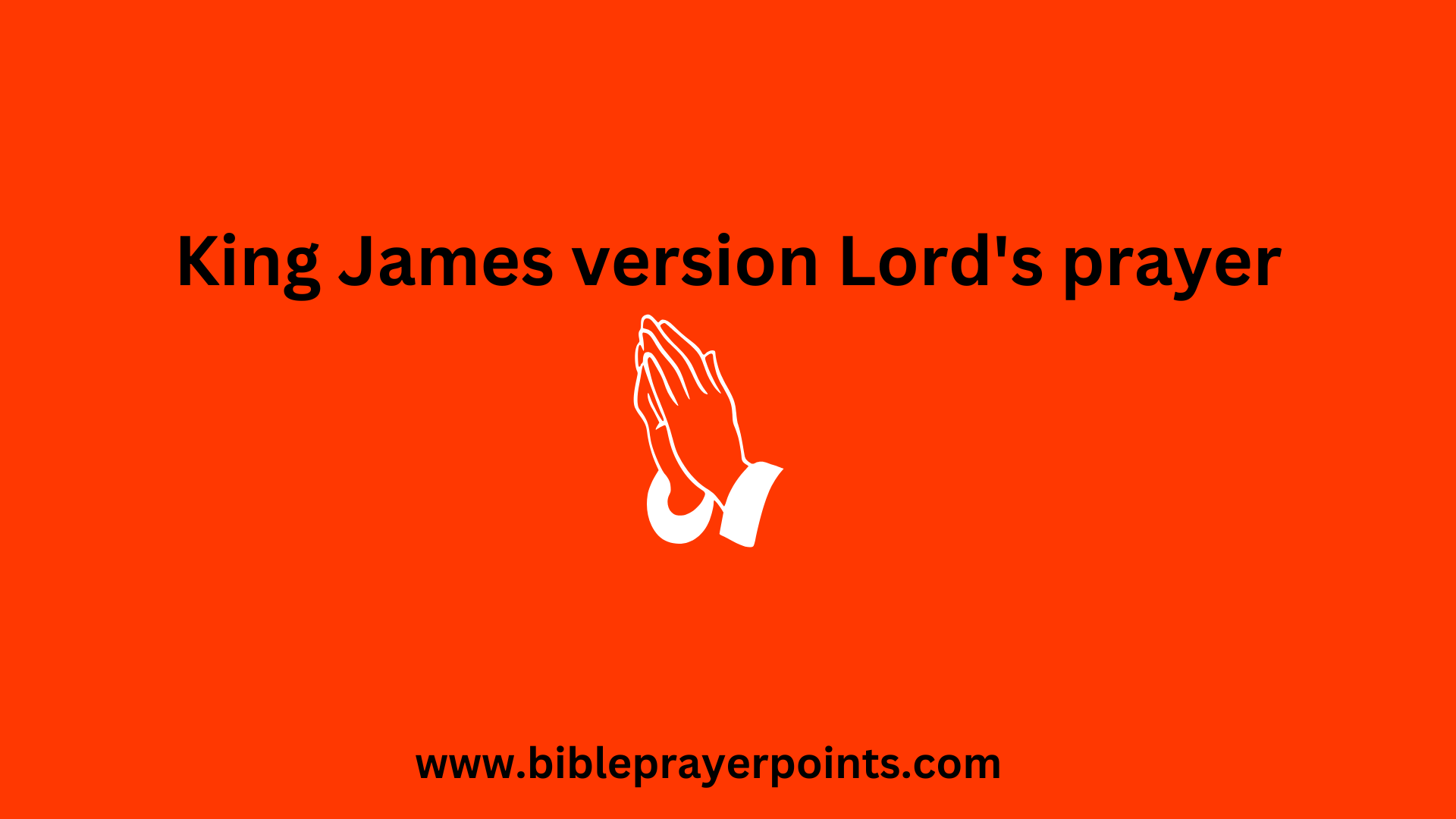King James version Lord’s prayer
9 After this manner therefore pray ye:
Our Father which art in heaven,
Hallowed be thy name.
10 Thy kingdom come.
Thy will be done in earth,
as it is in heaven.
11 Give us this day our daily bread.
12 And forgive us our debts,
as we forgive our debtors.
13 And lead us not into temptation,
but deliver us from evil:
For thine is the kingdom,
and the power, and the glory,
for ever. Amen.
Key Notes on the Lord’s Prayer
1. Our Father: Acknowledges God as our loving and caring Father.
2. Hallowed be thy name: Reverences God’s holiness and greatness.
3. Thy kingdom come: Prays for God’s rule and reign to be established.
4. Thy will be done: Surrenders to God’s perfect plan.
5. Daily bread: Asks for provision and sustenance.
6. Forgive us our debts: Seeks forgiveness and emphasizes the importance of forgiving others.
7. Lead us not into temptation: Requests guidance and protection from sin.
8. Deliver us from evil: Prays for deliverance from the enemy’s schemes.
9. For thine is the kingdom: Declares God’s eternal sovereignty, power, and glory.
Key Themes in the Lord’s Prayer
- Worship: The prayer begins and ends with praise, reminding us that prayer is first about honoring God.
- Surrender: It emphasizes submission to God’s will and His kingdom purposes.
- Dependence: We are called to rely on God for our daily needs, both physical and spiritual.
- Forgiveness: The prayer highlights the importance of forgiveness in our relationship with God and others.
- Protection: It acknowledges our need for God’s guidance and deliverance from evil.
Application for Today
The Lord’s Prayer is not just a set of words to recite but a model for how to pray. It teaches us to:
- Approach God with reverence and intimacy.
- Prioritize His will above our own.
- Trust Him for daily provision.
- Practice forgiveness and seek His protection.
Commentary
Verse 9: Our Father which art in heaven, Hallowed be thy name.
- Our Father: Jesus begins by addressing God as “Father,” emphasizing the intimate and personal relationship believers have with God. This was revolutionary at the time, as it shifted the perception of God from a distant ruler to a loving parent.
- Which art in heaven: While God is our Father, He is also transcendent—He reigns in heaven, reminding us of His majesty and sovereignty.
- Hallowed be thy name: “Hallowed” means holy or set apart. This phrase acknowledges God’s holiness and calls for reverence and worship. It sets the tone for prayer as an act of worship.
Verse 10: Thy kingdom come. Thy will be done in earth, as it is in heaven.
- Thy kingdom come: This is a prayer for God’s rule and reign to be fully established on earth. It reflects a longing for the fulfillment of God’s promises and the ultimate restoration of all things.
- Thy will be done: Surrendering to God’s will is central to the Christian life. This phrase expresses a desire for God’s purposes to prevail over our own desires and plans.
- As it is in heaven: Heaven is the standard of perfection where God’s will is perfectly obeyed. This prayer asks for that same obedience and alignment on earth.
Verse 11: Give us this day our daily bread.
- Give us: This phrase reflects dependence on God for our needs. It reminds us that every good gift comes from Him (James 1:17).
- Daily bread: While this can refer to physical sustenance, it also symbolizes our daily spiritual needs. It teaches us to trust God for provision one day at a time, just as the Israelites relied on manna in the wilderness (Exodus 16:4).
Verse 12: And forgive us our debts, as we forgive our debtors.
- Forgive us our debts: This acknowledges our sin and need for God’s forgiveness. In the KJV, “debts” refers to moral or spiritual obligations we fail to meet.
- As we forgive our debtors: Forgiveness is a two-way street. Jesus emphasizes that receiving God’s forgiveness is linked to our willingness to forgive others. This is further explained in Matthew 6:14-15, where Jesus states that if we do not forgive others, neither will our Father forgive us.
Verse 13: And lead us not into temptation, but deliver us from evil:
- Lead us not into temptation: This is a plea for God’s guidance and protection from situations that might lead us to sin. It acknowledges our human weakness and need for divine help.
- Deliver us from evil: Evil here can refer to both the devil and the general presence of sin in the world. It is a prayer for God’s intervention and protection from all forms of harm.
